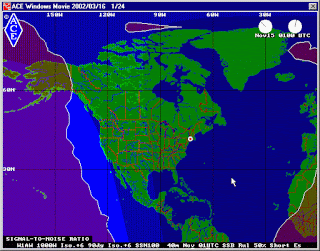Product: Weekly Highlights and Forecasts
:Issued: 2012 Nov 05 0312 UTC
# Prepared by the US Dept. of Commerce, NOAA, Space Weather Prediction Center
# Product description and SWPC web contact www.swpc.noaa.gov/weekly.html
#
# Weekly Highlights and Forecasts
#
Highlights of Solar and Geomagnetic Activity 29 October - 04 November 2012
Solar activity was at very low to low levels. The largest flares of the period were a pair of C1 flares from Regions 1596 (N07, L=150, class/area Eho/460 on 21 October) and 1598 (S12, L=111, class/area Dki/420 on 23 October) at 0507 UTC and 1139 UTC on 31 October, respectively. Other activity of note was a 24 degree long filament eruption centered at S32E07 that occurred from 0640-0855 UTC on 30 October. No Earth-directed coronal mass ejections (CMEs) were observed during the reporting period.
No proton events were observed at geosynchronous orbit.
The greater than 2 MeV electron flux at geosynchronous orbit was at moderate levels on 29-30 October and again on 01 November. High levels were reached on 31 October. Normal background levels were observed from 02-04 November.
Geomagnetic field activity was at quiet to active levels with major to severe storm periods observed at high latitudes. The period began with quiet conditions until a sudden increase in solar wind speed at the ACE spacecraft from 290 - 360 km/s occurred at approximately 31/1445 UTC. A sudden impulse (13 nT) was observed at the Boulder magnetometer at 1539 UTC on 31 October. This initial activity was due to a pair of CMEs resulting from filament eruptions on 27 and 28 October. The geomagnetic field responded with a unsettled period during the 1500-1800 UTC period on 31 October. At approximately 31/2348 UTC, the total magnetic field (Bt) increased from 9 to 15 nT
while the Bz component rotated to a southward (negative) component for approximately 20 hours (maximum deflection of 11 nT). The geomagnetic field responded with quiet to active levels with major to severe storm periods observed at high latitudes on 01 November. By 02 November through the rest of the reporting period, quiet conditions prevailed.
Forecast of Solar and Geomagnetic Activity 05 November - 01 December 2012
Solar activity is expected to be very low to low until 08 November. From 08-21 November, a chance for M-class flares exist as old Region 1594 (S27, L=199) rotates across the visible disk. From 22 November until the end of the forecast period, very low to low levels are expected.
No proton events are expected at geosynchronous orbit.
The greater than 2 MeV electron flux at geosynchronous orbit is expected to be at high levels from 09-24 November. Normal to moderate levels are expected from 25 November through 01 December.
Geomagnetic field activity is expected to be quiet to unsettled through the forecast period. Unsettled conditions with a chance for active periods are expected from 08-11 November and again on 13
November due to activity from a recurrent coronal hole high speed stream.
:Product: 27-day Space Weather Outlook Table 27DO.txt :Issued: 2012 Nov 05 0312 UTC # Prepared by the US Dept. of Commerce, NOAA, Space Weather Prediction Center # Product description and SWPC web contact www.swpc.noaa.gov/wwire.html # # 27-day Space Weather Outlook Table # Issued 2012-11-05 # # UTC Radio Flux Planetary Largest # Date 10.7 cm A Index Kp Index 2012 Nov 05 95 5 2 2012 Nov 06 100 5 2 2012 Nov 07 105 5 2 2012 Nov 08 110 10 3 2012 Nov 09 110 10 3 2012 Nov 10 110 10 3 2012 Nov 11 115 10 3 2012 Nov 12 115 5 2 2012 Nov 13 115 8 3 2012 Nov 14 115 5 2 2012 Nov 15 120 5 2 2012 Nov 16 115 5 2 2012 Nov 17 115 5 2 2012 Nov 18 110 5 2 2012 Nov 19 110 8 3 2012 Nov 20 110 5 2 2012 Nov 21 105 5 2 2012 Nov 22 100 5 2 2012 Nov 23 105 5 2 2012 Nov 24 105 5 2 2012 Nov 25 100 5 2 2012 Nov 26 100 5 2 2012 Nov 27 95 5 2 2012 Nov 28 90 5 2 2012 Nov 29 90 5 2 2012 Nov 30 90 5 2 2012 Dec 01 90 5 2 (NOAA)
